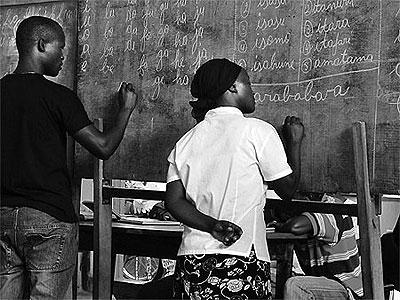Celestine Uwimana’s only wish was to at least learn how to read the bill boards, sign posts and street names in town; so he doesn’t always have to ask people for directions.


Celestine Uwimana’s only wish was to at least learn how to read the bill boards, sign posts and street names in town; so he doesn’t always have to ask people for directions.He never had the chance to have an education as his parents weren’t able to afford it, so he is among those you would categorize as illiterate."If only I would have a chance to at least learn the basics of learning how to read and write, my life would change. My self-esteem would be high. It would be a chance for me to get a fairly decent job as well,” he said. Uwimana is one of the many illiterate people who feel that a little education could do them justice and help them improve their lifestyles.Within our communities, there are successful people who didn’t really have a chance to have an education but just through knowing how to read, write and do basic calculations; they have thrived in doing businesses and other income generating activities.Another lady, Anonciatta 32, only wishes she knew the English or French language, and then she would live a better life.She dropped out in primary four since her parents could no longer afford her fees dues and other scholastic materials. She lost her parents and since she wasn’t able to get a paying job and had no garden to do some farming, she decided to take up the first offer she got into marriage.This was because she thought she would live off her husband’s pocket who also got so indulged in alcohol, wife battering and dating other women.She has six children and the husband doesn’t like to support his family because he spends the little he gets in the bar and other women.Anonciatta however feels like there is a ray of hope with the new literacy program that has been introduced in her area. She hopes to maximize this opportunity so she can be able to fend for her family and also hopes that her husband won’t step on her toes anymore after she has gotten some education and later start up an income generating activity."I have always admired tailors and after I have learnt some reading and writing, I will also learn how to sew clothes. I believe my life is going to change for the better after these trainings,” she added.Through the Australian government and Fight Illiteracy Youth Organization (FIYO), a local NGO that promotes literacy, over 200 vulnerable and illiterate residents of Cyaruzinga cell, Ndeera sector, shall no longer be classified under the bracket of illiterates.Moses Gahigi, the Executive Director of FIYO says that learning how to read and write is a great tool in empowering illiterate communities to help them start up their own income generating activities. After they have been taught, they will be awarded with Certificates that can help them while pursuing other income generating activities. FIYO will do follow-up for the people who have gone through the training and make more fundraising to help them gain more skills. The activity has been ongoing for at least a month in a bid to empower the community and help them develop through education. Many vocational jobs such as carpentry and tailoring require the basics of reading and writing; so through such lessons, the community is given chance to start up income generating activities.FIYO in partnership with the Australian government have impacted Ndeera sector, a community made up of mostly potters, who now have a chance to attain basic education.The NGO together with the Australian government are embarking on a one year project to give people skills in reading, writing and other vocational skills.According to Gahigi, "Illiteracy and ignorance are some of the prevailing causes of poverty in Rwanda and that is why we are focusing on overcoming illiteracy especially in the most affected areas, helping the most vulnerable groups.”He stated that in order to have a well off society, attaining an education is key, highlighting that not only formal education is needed but also people need to be educated in other cross-cutting issues such as health, environment, gender and HIV/AIDS among other issues."We are focusing on Ndeera sector for a year, after evaluating their concerns. 90 per cent of this community has illiterate people, so we want to address this problem. We shall spend over USD 70,000 and the Australian government has committed USD 55, 000,” he said.Gahigi added that besides teaching the local community how to read and write, they will also be taught about the other crucial issues with in society.Over 5,000 people have so far been taught through FIYO’s literacy programs and some have been able to gain vocational training and been equipped with a number of skills that are helping them earn a living. Some of them have gotten training in sewing and carpentry among the other trainings.FIYO started as an NGO focusing on the youth who had never had a chance to get a decent education and those who dropped out but the organization has now integrated literacy programs for adults as well.This was after ascertaining an overriding need for literacy among the adults in many Rwandan communities.Since its inception in 2003, they have operated in Gastibo and Nyagatare districts, training over 5000 people in literacy skills, for more than seven years now.With more of such empowering programs, the illiterate and vulnerable will have a chance to a decent life as well.


